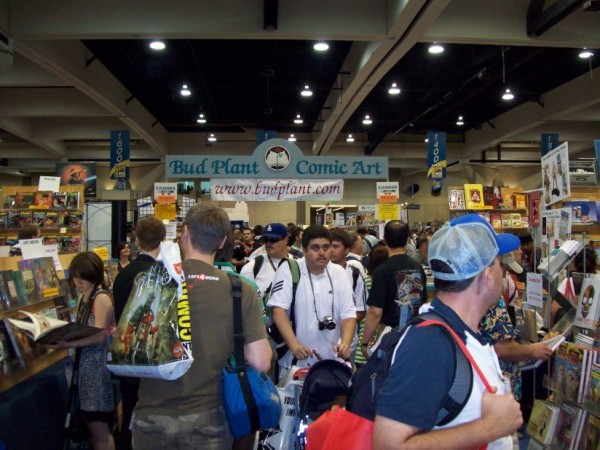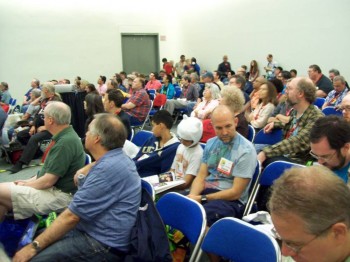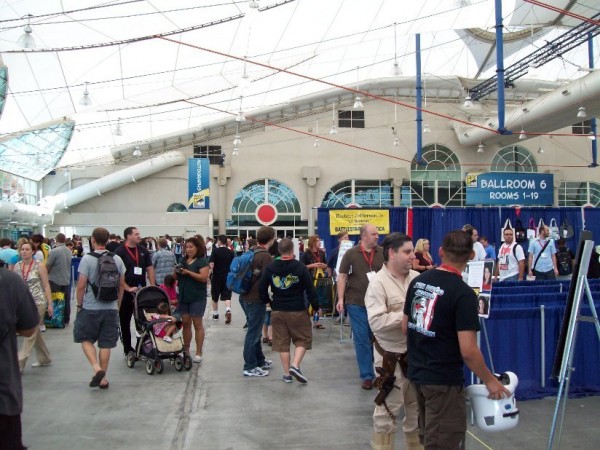
January 31, 2013
 Festivals Extra: Comic-Con Pro Registration Rumblings
Festivals Extra: Comic-Con Pro Registration Rumblings


I was curious about the articles I read
here and
here about professional registration for
San Diego's Comic-Con International, and the tweets I also saw about people's frustrations with the process, some of which made it into the first linked-to article.
Comics culture has this odd but understandable element to it where everything gets processed immediately and through very self-involved mechanisms. I will always remember one convention in particular as the kind of ultimate example of this. At an event where people were being sent home, there was a flurry of "Wow, what an exciting adventure this is" writing from people that either were able to get in or even snuck into the show in some way. This seemed to me at the time to be really ungenerous in terms of what had just gone down. That unnamed show, and people's reactions to other folks' plight, have improved since then. But it's not like myopia is a rare thing for comics. It's no secret that when comics people write about the future of comics, it's almost always through the prism of what they themselves enjoy consuming and perhaps even making. Very few of us see a future of comics without ourselves somehow involved.

Let's be up front that I have a double bias here. Comic-Con International is a longtime
CR advertiser, so there's that. I also have no problem registering for that show as a reasonably valuable (to them) member of the press, I think because of our focus on the comics part of the show. So anything I have to say about the way other people react is going to be potentially distorted: I got mine, and more besides. Still, I wanted to check with them on a couple of things, so I exchanged e-mails with their PR point man David Glanzer about what happened, why people got upset. It sounds to me like a case of increased demand and some changes in policy cross-pollinating with a technical failure on that first day to result in some frustrated comics people. My takeaway:
1. Any new hassles in registering are not the result of increased favor to non-comics passes. "We're seeing an increase in all pro categories. So more comics pros and more pros from other fields," Glanzer told
CR. This is an important point for Comic-Con, because as comics people -- and they are comics people -- running a comics and media show, they don't want to be inaccurately seen as favoring the media part of their show over the comics part. So the idea that got floated that some studio functionary was going to get a badge at the expense of Joe Comics Pro is something they'd like to see squashed. They are not taking away from the comics side of the guest list and adding to the non-comics side. They're seeing increased demand across the board.
2. They added a category to better facilitate non-creatives, but that new category did not draw any of the number they're placing in the convention center from the more traditional creative professional allotment. Glanzer said the category is called "Trade Pro" and those folks pay for their badges.
3. They don't factor in years you've attended. "This isn't a criterion," Glanzer wrote. I think this is key to know, because I think there's an idea that by attending a show a bunch of times, that show is somehow in a relationship with you that they need to honor. Indeed, some shows function that way, and god bless them. I guess that's fundamentally not the case with Comic-Con, of course. What's ironic, of course, is that many pros complain about fans of their work feeling as if they're owed something for
their past patronage.
4. Panel participants are either drawn from the pool of attending pros or are given a pass based on a pool completely different from that of the professional allotment. This is actually a complaint I've heard only a couple of times, but I have heard it: that if you're a pro that isn't appealing to the convention in the way that a big current star might be, the kind invited into programming, you're less likely
for that factor alone of being able to contribute to receive professional accreditation. Glanzer assures me this isn't the case.
5. The criteria in general haven't changed. "I'm perplexed by this assumption," Glanzer says.
So things are different only in that Comic-Con has more people than ever in all categories seeing accreditation, and they've altered demands for free guests of professionals from automatic to apply-for status. Pro registration for Comic-Con 2013
remains open, despite claims based on a technical glitch the first day that this had shut down or that people were being asked to wait until 2014. Free passes for guests are gone; paid ones remain a possibility.
It stinks when you can't make cons work the way you want them to. I recently had plans altered because two shows didn't want to fulfill the outer edge of my accreditation requests. It happens. I think Comic-Con is a fun comics show: I get a lot of professional value on it, and I think to a certain extent it's on comics people to make that opportunity work as opposed to kind of grumpily folding our arms and making sure it takes care of us. As I'm sure a ton of people have pointed out, Comic-Con exists as one star in a constellation of really good shows right now. And while those shows may not work exactly as we want them to, either, there are certainly shows that work out more than perfectly for different groups of people. God bless 'em all.
 posted 7:00 am PST
posted 7:00 am PST |
Permalink
Daily Blog Archives
November 2019
October 2019
September 2019
August 2019
July 2019
Full Archives


